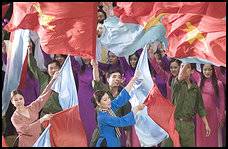Vietnamese perform during celebrations at National Assembly in Hanoi, Vietnam, Friday, April 29, 2005. April 30 is the 30th anniversary of the end of the Vietnam War. (AP Photo/Doan Bao Chau) (Doan Bao Chau - AP) Giant billboards of Ho Chi Minh, Vietnam's revolutionary leader, dominated the parade ground and adjoining streets which had been blocked off to the public because of security concerns.On April 30, 1975, North Vietnamese tanks barreled through the gates of the palace, the heart of the U.S.-backed Saigon government. The fall of Saigon marked the official end to the Vietnam War, and the U.S.'s decade-long involvement in Southeast Asia. The war claimed some 58,000 American lives and an estimated 3 million Vietnamese. "I was listening to the radio with my family and heard that Saigon had been liberated. I was very happy because for many years we weren't free. After 30 years we have rebuilt our country. Our land is safe and secure and I think the future will be better for my children," said To Thanh Nghia, 51, a government worker marching in the parade. But the atmosphere in the country three decades later has been mostly festive, focusing on Vietnam's economic rejuvenation in recent years. Memories of the war and its aftermath are little more than anecdotes in history books for the majority of the country's population who were born after it ended. "My father and grandfather fought in the war but I was too young. I think my future will be good because they created opportunities for my generation," said Nguyen Thanh Tung, an 18-year-old student. Taking part in the parade, he wore a drab olive uniform and wielded a wooden gun. Down the grand boulevard where Communist tanks once rolled in, capitalism has taken solid root. Many of the parade floats were sponsored by American companies including VISA and American Express. One float featured women pushing shopping carts loaded with supermarket goods. These days, Le Duan Street is home to Diamond Plaza, a glittering, upscale department store where French perfumes and Italian shoes are sold to an emerging urban, middle class. Along the same strip, a French-owned five-star hotel sits across the street from the U.S. consulate, rebuilt after the former U.S. Embassy was razed in the late 1990s. While Vietnam proudly recalled its victories over both the United States and colonial France, the focus was clearly on the future. "Through our two resistance (wars) against foreign aggressors the historical clashes in Saigon will always be in the forefront," said President Tran Duc Luong to cheers from the crowd. He called Ho Chi Minh City, the former Saigon, the country's "economic locomotive." "Over the past 30 years the city's people ... have overcome the challenges and difficulties of war. The city has recorded huge achievements in all fields," he said. With the president on the giant reviewing platform was a guest of honor, Raul Castro, the brother and successor to Cuba's longtime leader Fidel Castro who stood by Vietnam's communist regime for decades. Also flanking the leader was Giap, the military mastermind who defeated the French at Dien Bien Phu and ousted the Americans. Despite Vietnam's remarkable recovery from the devastation of war, most of Vietnam's largely agrarian population of 82 million remains poor with per capita income hovering around $550 a year. Once among the most desperate nations in the world, Vietnam is now on the crest of an economic wave that saw annual growth of 7.7 percent last year _ second only to China in Asia. Though the country's reunification of North and South occurred 30 years ago, the task of reconciliation still looms large. On Friday, Prime Minister Phan Van Khai sent out a message reaching out to Vietnam's former enemies, as well as to those who fought on the side of the former South Vietnam, urging all sides to "close the past, look to the future." At least with the United States, Hanoi's ties have become increasingly strong as America became Vietnam's single largest trading partner. But relations with overseas Vietnamese, who sent back nearly $4 billion in remittances last year, remain more sensitive. |
